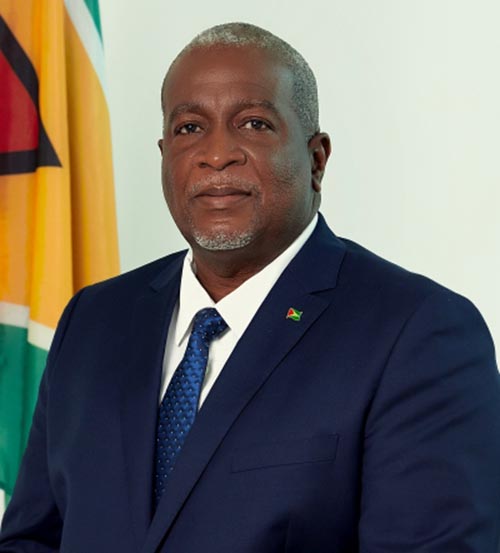While the government is hoping that competition in the telecoms sector will see services expanded to unserved areas, it will also be rolling out its own countrywide evaluation soon to determine specific needs, Prime Minister Mark Phillips says.
By the end of February next year, government hopes that the fan-out exercise will provide it with the answers needed to plug in resources from a $360 million Universality fund to cater for those areas getting the needed telecommunication services.
In response to questions from the Sunday Stabroek on the availability of basic telecommunications services in outlying and rural areas, the Prime Minister, who has responsibility for the telecoms sector, underscored that the fundamental philosophy behind the Telecommunications Act, is that universal access to telecommunications services should be achieved through a combination of competition and government intervention.
“We are looking first of all to competition amongst operators resulting in coverage of most of our population. The residual unserved areas would then be served through interventions of the Universality fund,” Phillips told this newspaper.
“With respect to competition, we knew that the effects of liberalisation would not come overnight. It will take time to land additional submarine cables to bring fuller competition to the market for international broadband Internet. To the extent that what we really need to see is increased penetration in fixed broadband, it takes time for new entrants to that market to roll out their networks to cover the country. We therefore need to give [them] some time to see the extent to which coverage improves as competition heats up.”
In the meantime, Phillips informed that government was “actively working on putting together a Universal Services and Access Plan which will deal with funding access to underserved populations.”
“A consultant is working with the Telecommunications Agency to do this. They are shortly going to be fanning out over the country holding consultations in all regions to determine the needs,” he stressed.
The $360 million Universality fund will allow poor and vulnerable communities to access greater Information and Communication Technologies (ICT), Minister of Finance Dr Ashni Singh had announced in his 2021 Budget presentation.
Phillips pointed out that while a popular view is that the hinterland regions are underserved, they are not the only places with underserved populations as there are coastal and riverain areas to which coverage needs to be extended. “These areas are also receiving our attention.”
Mibicuri, Black Bush Polder resident Shakuntala Devi Sookraj lamented in a letter to Stabroek News the struggles people, especially children, face daily, given that work now is done online because of the COVID-19 pandemic. “We don’t have landlines and we hardly get service here. I had called GTT and they said they don’t offer service here. There are Atlantic Wireless Network and Global access but the services are poor. Most times we have to put on data plans [on cell phones] so the children can go online but even with that the signal is not always good,” she stressed.
Sookraj, a former University of Guyana student, said youth in the area suffer the most as they are unable to research homework and complete tasks requiring telecommunications availability. “I continue to complain about us not having services. I have written many posts and even tagging the president in them. I just hope that someone takes us into consideration,” she said.
Phillips said that government has plans to address the deficient services in the country and the countrywide evaluation will identify affected areas.
“We will shortly be fanning out to get an up-to-date assessment of the gaps in coverage and we are committed to maximize coverage in the shortest possible timeframe.
“We should have in a matter of eight to twelve weeks a better idea of the schedule on which some of these communities in need will have access to services.”
‘Complex issue’
He noted, too, that while prospective new telecoms sector entrant Green Gibraltar had announced that it was seeking approval to install and operate a 5G telecommunications network in only seven of the country’s regions and excluding the hinterland, it has since changed the areas it highlighted and is now applying to service all ten regions.
Asked if the regions originally listed by Green Gibraltar were provided by government as areas that operation licences can be granted for, Phillips replied, “Government is not at present prescribing areas of coverage to entrants who are self-funding their networks. We discerned from what was put before us, that that particular company’s rollout plans covered those regions.”
“They have subsequently indicated that they would like to serve all regions and we are examining those submissions. When we come to the stage where we are ready to launch projects financed from the Universality Fund, we will need to prescribe the areas to be covered,” he added.
With regard to the remaining spectrum space here, the Prime Minister was asked why the government hasn’t publicly tendered for access to it. Questions have been raised as to how Green Gibraltar knew of the spectrum availability and whether others should have been given an opportunity.
Pressed on whether the government wouldn’t have more leverage and bargaining power by sharing its vision for the telecommunications sector with the public and that companies would know upfront the services they will be required to provide, Phillips said it was a complex issue that sometimes ends up with consumers paying way more for services.
“Auctions are only one of several recognised approaches to assigning spectrum. They do have several advantages, one of which is that they allow for operators to factor into account, obligations such as coverage and quality of service up front. However, auctions also have severe disadvantages and risks. At the end of the day, predicting prices, revenues, and technology trends over the life of a spectrum authorisation – typically fifteen years or more – has some degree of uncertainty. It is not uncommon for operators to overbid and this ultimately hurts the consumer,” he explained.
“Auctions are also difficult and time-consuming to design and easy to get wrong. It is beginning to become evident that while auctions work well as a revenue-generating measure, this is many times at odds with the developmental objectives of maximising affordability and access to the consumer,” he said.
It is against this background that he stated that government’s objective following liberalisation is to maximise the speed with which it can “sensibly put spectrum in the hands of the operators so that they can deploy new and better services to consumers”.
“We have recently assigned 40MHz total spectrum to the three main facilities-based operators and we are currently in the process of finalising short and medium-term frameworks for spectrum management, including pricing and planning for future needs,” he disclosed.
On the one-year anniversary of telecommunications liberalisation here, the Prime Minister had traced developments since the October 5, 2020 and argued that benefits had accrued to the public.
He pointed out that the government granted new licences to the Guyana Telephone & Telegraph Company Limited (GTT) and U-Mobile (Cellular) Inc., and also issued a licence to a third operator, E-Networks Inc.
Further, on October 23, 2020, seven accompanying Telecommunications Regulations became effective: Licensing and Frequency Authorisation; Spectrum Management; Universal Access and Universal Services; Interconnection and Access; Pricing; Consumer Protection; and Competition.
As a consequence, the PM said that competition has increased and modern (4G and beyond) service is being extended to previously underserved areas, such as the Essequibo coast.
He contended that competition is driving innovation as companies move to improve their service and keep/acquire customers, and operators are investing in networks to provide modern and up-to-date services to Guyanese in order to win and retain customers.
He said that all operators are moving to roll out 4G, 4.5G and 5G networks.
The PM pointed out that GTT recently moved their data plan expiry rollover window from one hour to 24 hrs.
Phillips had also cited the “Double your data plans” offered by Digicel, whereby customers get more data for the same money spent and added that the wholesale prices for Internet bandwidth are being reduced.
He also stated that the government recognises that the capacity of the regulatory bodies must be built. In this regard, he assured, the government is committed to strengthening the Telecommunications Agency in preparation for regulating in a liberalised environment.








